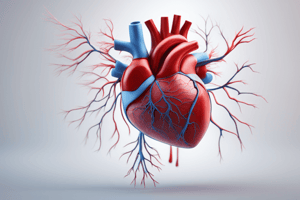Podcast
Questions and Answers
What does BP stand for?
What does BP stand for?
- Coronary artery bypass graft
- Congestive heart failure
- Blood pressure (correct)
- Beats per minute
What does bpm stand for?
What does bpm stand for?
beats per minute
What does CABG stand for?
What does CABG stand for?
coronary artery bypass graft
What does CAD stand for?
What does CAD stand for?
What does CHF stand for?
What does CHF stand for?
What does CV stand for?
What does CV stand for?
What does ECG/EKG stand for?
What does ECG/EKG stand for?
What does HTN stand for?
What does HTN stand for?
What does ICD stand for?
What does ICD stand for?
What does LAD stand for?
What does LAD stand for?
What does MI stand for?
What does MI stand for?
What does mmHg stand for?
What does mmHg stand for?
What does MUGA stand for?
What does MUGA stand for?
What does PAD stand for?
What does PAD stand for?
What does PET stand for?
What does PET stand for?
What does PTCA stand for?
What does PTCA stand for?
What does PVCs stand for?
What does PVCs stand for?
Flashcards are hidden until you start studying
Study Notes
Cardiovascular Medical Abbreviations
- BP: Refers to blood pressure, a critical measurement of force exerted by circulating blood on the walls of blood vessels.
- bpm: Indicates beats per minute, a measurement of heart rate and vital to assess cardiovascular health.
- CABG: Stands for coronary artery bypass graft, a surgical procedure used to improve blood flow to the heart.
- CAD: Represents coronary artery disease, a condition characterized by the narrowing or blockage of coronary arteries.
- CHF: Denotes congestive heart failure, a syndrome where the heart cannot pump enough blood to meet the body’s needs.
- CV: An abbreviation for cardiovascular, relating to the heart and blood vessels and their disorders.
- ECG/EKG: Refers to electrocardiogram, a test that records the electrical activity of the heart over a period.
- HTN: Stands for hypertension, a condition of persistently elevated blood pressure, increasing the risk of heart disease.
- ICD: Represents an implantable cardioverter defibrillator, a device implanted in patients at risk of life-threatening arrhythmias.
- LAD: Refers to left anterior descending, a major artery supplying blood to the heart; often involved in coronary artery disease.
- MI: Stands for myocardial infarction, commonly known as a heart attack, resulting from the interruption of blood supply to a part of the heart.
- mmHg: Represents millimeters of mercury, a unit of measurement commonly used to measure blood pressure.
- MUGA: Refers to multigated acquisition scan, a nuclear medicine test that evaluates heart function and blood flow.
- PAD: Stands for peripheral artery disease, a common circulatory problem where narrowed arteries reduce blood flow to the limbs.
- PET: Refers to positron emission tomography, an imaging test that helps reveal how tissues and organs are functioning.
- PTCA: Denotes percutaneous transluminal coronary angioplasty, a non-surgical technique used to treat narrowing of the coronary arteries.
- PVCs: Stands for premature ventricular contractions, extra heartbeats that disrupt the normal rhythm, possibly signaling underlying heart issues.
Studying That Suits You
Use AI to generate personalized quizzes and flashcards to suit your learning preferences.




